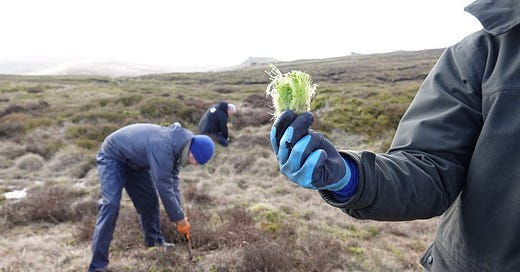Wetland round-up
- Keep up-to-date with the latest wetland and water related news, research and jobs. If you’d like to receive regular updates on all things wetland, please subscribe to this newsletter.
🧾 Wetlands in the news
Cows controlled with music-playing GPS tracker graze saltmarshes
Farmers are controlling cows with a GPS tracker that plays Waltzing Matilda when they get too close to a virtual fence around certain areas of a saltmarsh in Somerset, UK. Controlled grazing is an important tool for conservation of many habitats, including wetlands, and this method will hopefully protect the cattle and vulnerable areas of the saltmarsh.
Feral horses in Australia’s high country are damaging peatlands
Australia has more feral horses than any other country and their numbers have been growing. Unfortunately, they are causing soil erosion and compaction, and in peatlands, where soils are soft and wet, the damage from grazing and trampling is even more pronounced. Worryingly this is resulting in a serious decrease in the carbon stored by these peatlands.
Indonesian company defies order, still clearing peatlands in orangutan habitat
It is reported that Indonesia’s largest deforesting company has continued to clear peatland despite an order by the government for the firm to stop clearing rainforests and peat swamps. The article states that a staggering 30,296 hectares (74,900 acres) of peatland have been destroyed, including protected areas known to be the habitat of the critically endangered Bornean orangutans (Pongo pygmaeus).
Australia celebrates 50th anniversary of the world’s first Ramsar wetland
A fantastic event to celebrate: 50-years-ago, Australia made history by promising to conserve the globally significant wetlands of the Cobourg Peninsula in the Northern Territory. Australia’s listing of the wetlands on 8 May 1974 paved the way for over 2,500 wetland sites around the world. These sites are listed under the Convention on Wetlands of International Importance. The agreement is sometimes known as the Ramsar Convention, for the town in Iran where the Convention was signed. Ramsar sites now cover more than 250 million hectares of our planet.
Moss 'speed bumps' on Kinder Scout will curb flooding and restore peatland
Sphagnum moss "speed bumps" are being planted across the slopes of a nature reserve in the Peak District, UK. It is hoped the hundreds of thousands of green strips will slow water's progress down the inclines of Kinder Scout: acting as tiny "speed bumps" for rainwater falling on the moors. Instead of running down in a straight line, the water will be forced to weave its way more slowly, rather than arriving in streams and rivers at once. The work is being carried out by the National Trust and will help restore 526 hectares of peatland – and I am loving the “speed bump” analogy of their work!
🧪 Wetland research
The crucial role of scavengers in wetlands
It’s always good to see research on the lesser considered areas of wetland science. Especially as they often highlight how connected all the different aspects of wetland ecology, hydrology, biogeochemistry, and all the other disciplines of research, actually are. This study is a great example, as it looks at the role of scavengers and carrion in wetlands. It suggests they have essential functions in these habitats, such as the recycling and transportation of nutrients and the regulation of water quality, benefiting the entire ecosystem, from soil and plants to birds and mammals.
💰 Wetland jobs
Ecologist - Norfolk Rivers Trust
Norfolk Rivers Trust aims to deliver catchment-scale change to the area’s water environment, protecting watercourses from pollution, improving habitat and ecological functioning of streams and rivers, and enhancing resilience to climate change. The Trust is looking for someone to complete baseline habitat, species and Biodiversity Net Gain surveys and reporting in Norfolk.
Tarmac is a leading sustainable building materials and construction solutions business. It is seeking a Restoration Manager to join its Restoration team, and the role will involve working on projects transforming sites into nature reserves and wetland habitats.
Get in-touch 📢
If you’d like to get in-touch please follow Dr Christian Dunn on Twitter/X (@christiandunn) or Instagram (@drchristiandunn), or email c.dunn@bangor.ac.uk.
If you have an image, news item, research item, or job you’d like to share in this newsletter, please get in-touch.




